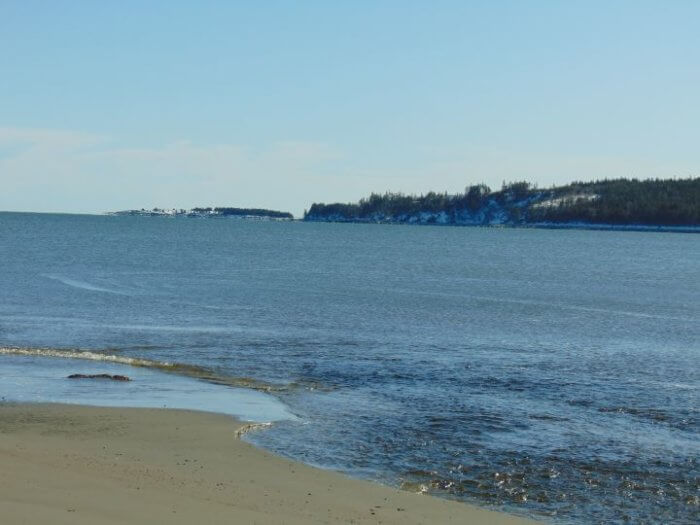We’re delighted to announce that after researching hundreds of locations in Washington state, British Columbia and Nova Scotia, the Whale Sanctuary Project has selected Port Hilford, Nova Scotia, as the best site to create a seaside sanctuary for whales being retired from entertainment parks.
We look forward to working together with the people of Sherbrooke and the Municipality of the District of St. Mary’s who have opened their home and their hearts to the whales.
Below is a copy of the announcement, and we look forward to posting more news, photos and information over the coming days and weeks about the site and the people of the region.
Many thanks to all of you who have supported the Whale Sanctuary Project throughout this extensive search, and especially to our lead sponsor, Munchkin, Inc., makers of unique products for babies and children, without whom we could not have begun this project.

Port Hilford, Nova Scotia
Whale Sanctuary Project selects Port Hilford, Nova Scotia, for North America’s first sanctuary for captive whales
Will work with local community to create a permanent seaside home for whales retired from marine parks
HALIFAX, Nova Scotia – Feb. 26, 2020 – The Whale Sanctuary Project has announced that it will work together with Sherbrooke and the Municipality of the District of St. Mary’s on the Eastern Shore of Nova Scotia to create a seaside sanctuary in Port Hilford for whales being retired from entertainment parks.
“Of the hundreds of locations that we’ve researched in British Columbia, Washington state and Nova Scotia, Port Hilford stands out as the premier location for a whale sanctuary,” said Charles Vinick, executive director of the Whale Sanctuary Project.
Port Hilford offers an expansive area that can be netted off for the whales in a bay that’s open to the ocean but is sheltered from storms. It has access to necessary infrastructure and plenty of room along the shore for the facilities that will be needed to care for the animals, as well as for an onsite education and interpretive center.
“It’s an ideal location for whales coming from marine parks and aquariums,” Vinick said, “You couldn’t ask for a more welcoming and eager community than the people of the Sherbrooke area.”
Intelligent and socially complex animals
The plan to locate a sanctuary in Nova Scotia comes in the wake of Parliament passing Bill S-203 in 2019 to bring an end to keeping whales and dolphins captive in Canada.
“Whales and dolphins are highly intelligent, emotionally sensitive and socially complex animals,” said Dr. Lori Marino, president of the Whale Sanctuary Project. “In the confines of a concrete tank at a marine park they suffer chronic stress and then often fatal illness. Relocating them to an ocean environment will give them a healthier life where they can thrive.”
Marino added that the whales captured the imagination of the people of Sherbrooke from the very first meeting. “They’ve been holding special activities for the kids,” she said. “It’s as though they’ve already made the whales part of their community. And the town already has the feel of a sanctuary.”
Support from local community
Dr. Stephen Flemming, executive director of Sherbrooke Village Museum, is delighted at the prospect of having a whale sanctuary nearby.
“The Museum, through the Rural Institute for Cultural Heritage and Environmental Sustainability, has been pleased to assist the work of the Whale Sanctuary Project to date, and looks forward to continuing its efforts to help see this project through to fruition,” he said. “I couldn’t be more pleased that this group of distinguished cetacean experts chose Nova Scotia for their first sanctuary.”
Minister Lloyd Hines, Member of Legislative Assembly for Nova Scotia, added that the Sherbrooke community is looking forward to playing host to North America’s first seaside whale sanctuary.
“We are truly honored to participate in this very special project,” he said.
Next steps
The next steps in working toward the creation of a sanctuary will be to work with local fishers and community members to further define the vision for the whale sanctuary, and to initiate the regulatory processes needed to establish the site.
The Whale Sanctuary Project’s objective is to have the sanctuary ready to receive whales in 2022.
Dozens of considerations went into selecting the best location for a seaside sanctuary: from water analysis to sea-floor conditions, to tides and currents, to potential impacts of local wildlife on the whales and vice-versa. Members of the organization visited locations along the south and the eastern shores, and met with communities in Shelburne, Liverpool, Port Hawkesbury and Sheet Harbour as well as Sherbrooke to seek proposals for potential sites.
“As important as the physical properties of the location are in deciding on a site location, we also knew that the relationship the sanctuary would have with its host community would be pivotal,” Vinick explained. “The Sherbrooke community has exceeded all our expectations.”
Plans for the sanctuary include a visitor center, nature trail and viewing spots. The sanctuary will also work with schools and museums to offer educational programs about the whales at the sanctuary and their counterparts in the wild.
Funding for the creation and operation of the sanctuary will be through private donations. Funding for the two-year search for an ideal site for the sanctuary has been led by Munchkin, Inc., makers of unique products for babies and children.
The mission of the Whale Sanctuary Project is to establish a model seaside sanctuary where whales and dolphins can be rehabilitated or can live permanently in an environment that maximizes well-being and autonomy and is as close as possible to their natural habitat.